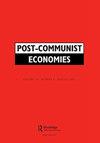Impact of the environmental taxes on reduction of emission from transport in Latvia
IF 1.8
3区 经济学
Q2 ECONOMICS
引用次数: 7
Abstract
ABSTRACT Transport has a significant contribution to climate change and many post-Soviet republics, including Latvia, struggle to decrease these emissions to reach carbon neutrality by 2050. In this paper, we have focused on the assessment of environmental taxes (energy, transport) as the most important economic instrument used in Latvia’s environmental policy to reduce transport-related emissions and predict road transport decarbonisation pathways using the regression analyses. The results show that existing environmental taxes in Latvia reduce transport emissions and also have a significant fiscal impact. The research confirms that fuel consumption has the most significant effect on transport emissions. To achieve a decarbonisation target, a significant reduction in fossil fuel consumption is required. This can be achieved by increasing taxes on fuel, supporting environmentally friendly infrastructure as well as increasing motivation for electric car use and social innovation (e.g. modal shift, car-pooling, teleconferencing) to decrease the demand for mobility.环境税对拉脱维亚减少运输排放的影响
交通运输对气候变化的影响很大,包括拉脱维亚在内的许多后苏联共和国都在努力减少交通运输的排放,以便到2050年达到碳中和。在本文中,我们专注于评估环境税(能源,运输)作为拉脱维亚环境政策中使用的最重要的经济工具,以减少与运输相关的排放,并使用回归分析预测道路运输脱碳途径。结果表明,拉脱维亚现有的环境税减少了交通排放,也有显著的财政影响。研究证实,燃料消耗对交通排放的影响最为显著。为了实现脱碳目标,需要大幅减少化石燃料的消耗。这可以通过增加燃油税、支持环境友好型基础设施以及增加对电动汽车使用和社会创新(例如模式转换、拼车、电话会议)的激励来实现,以减少对机动性的需求。
本文章由计算机程序翻译,如有差异,请以英文原文为准。
求助全文
约1分钟内获得全文
求助全文
来源期刊

Post-Communist Economies
ECONOMICS-
CiteScore
4.90
自引率
18.20%
发文量
21
期刊介绍:
Post-Communist Economies publishes key research and policy articles in the analysis of post-communist economies. The basic transformation in the past two decades through stabilisation, liberalisation and privatisation has been completed in virtually all of the former communist countries, but despite the dramatic changes that have taken place, the post-communist economies still form a clearly identifiable group, distinguished by the impact of the years of communist rule. Post-communist economies still present distinctive problems that make them a particular focus of research.
 求助内容:
求助内容: 应助结果提醒方式:
应助结果提醒方式:


